
My previous guide for Jackett involved the use of Task Scheduler. Today I’m offering a recommended and excellent alternative for installing the latest Jackett version via Portainer. Jackett works as a proxy server. It translates queries from apps (Sonarr, SickRage, CouchPotato, Mylar, etc) into tracker-site-specific http queries, parses the html response, then sends results back to the requesting software. This allows for getting recent uploads (like RSS) and performing searches. Jackett is a single repository of maintained indexer scraping & translation logic. In this step by step guide I will show you how to install Jackett on your Synology NAS using Docker & Portainer. Note: If you are looking for a Jackett alternative, take a look at Prowlarr.
STEP 1
Please Support My work by Making a Donation.
STEP 2
Install Portainer using my step by step guide. If you already have Portainer installed on your Synology NAS, skip this STEP. Attention: Make sure you have installed the latest Portainer version.
STEP 3
Go to File Station and open the docker folder. Inside the docker folder, create one new folder and name it jackett. Follow the instructions in the image below.
Note: Be careful to enter only lowercase, not uppercase letters.
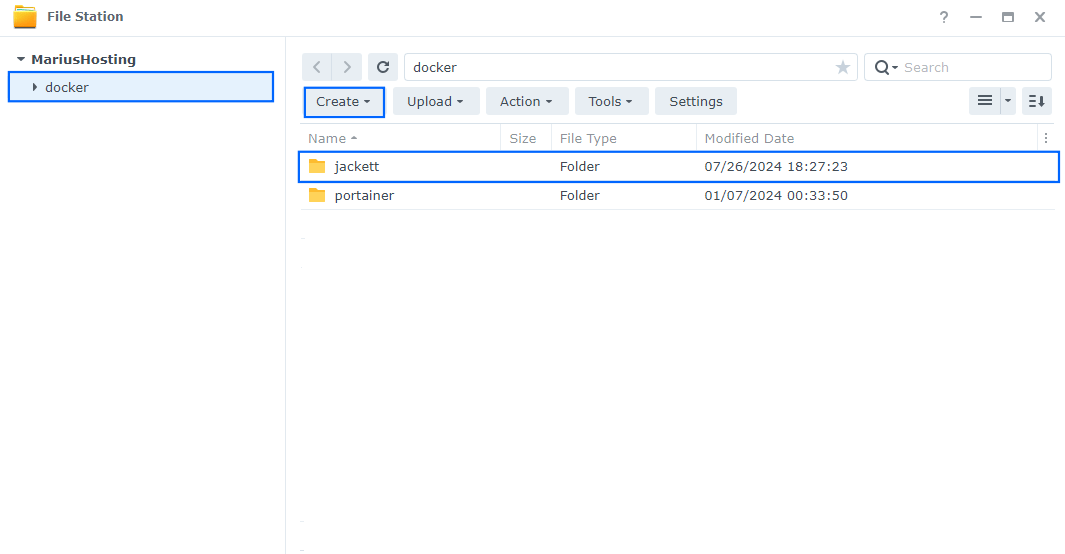
STEP 4
Now create two new folders inside the jackett folder that you have previously created at STEP 3. Name them config and downloads. Follow the instructions in the image below.
Note: Be careful to enter only lowercase, not uppercase letters.
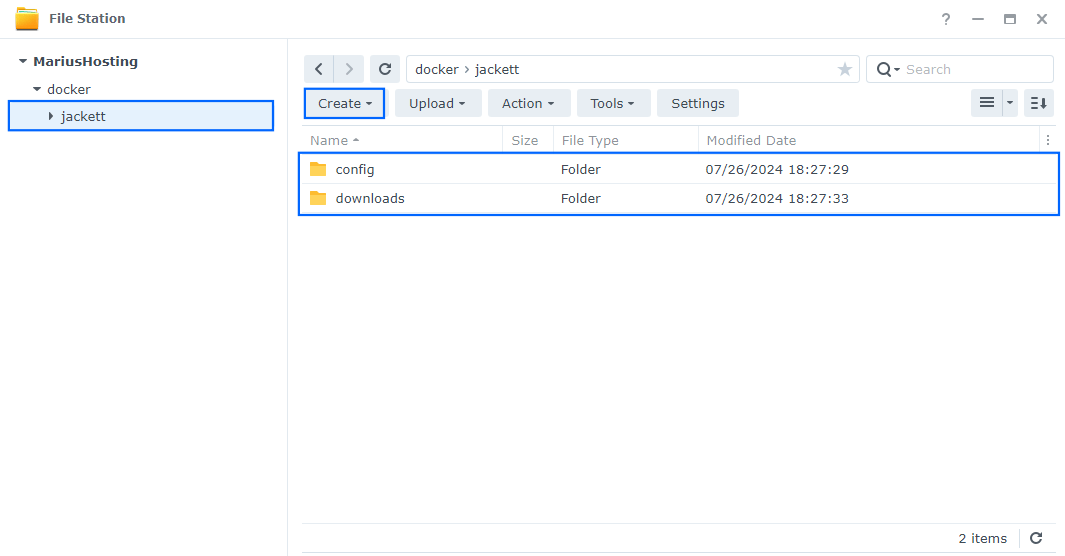
STEP 5
Log into Portainer using your username and password. On the left sidebar in Portainer, click on Home then Live connect. Follow the instructions in the image below.

On the left sidebar in Portainer, click on Stacks then + Add stack. Follow the instructions in the image below.

STEP 6
In the Name field type in jackett. Follow the instructions in the image below.
version: "3.9"
services:
jackett:
container_name: Jackett
image: ghcr.io/linuxserver/jackett
healthcheck:
test: timeout 10s bash -c ':> /dev/tcp/127.0.0.1/9117' || exit 1
interval: 10s
timeout: 5s
retries: 3
start_period: 90s
volumes:
- /volume1/docker/jackett/config:/config:rw
- /volume1/docker/jackett/downloads:/downloads:rw
environment:
- PUID=1026
- PGID=100
- TZ=Europe/Bucharest
- AUTO_UPDATE=true
ports:
- 9117:9117
restart: on-failure:5
flaresolverr:
image: ghcr.io/flaresolverr/flaresolverr:latest
container_name: Jackett-FlareSolverr
healthcheck:
test: timeout 10s bash -c ':> /dev/tcp/127.0.0.1/8191' || exit 1
interval: 10s
timeout: 5s
retries: 3
start_period: 90s
environment:
- LOG_LEVEL=info
- LOG_HTML=false
- CAPTCHA_SOLVER=none
- TZ=Europe/Bucharest
ports:
- 8191:8191
restart: on-failure:5
Note: Before you paste the code above in the Web editor area below, change the value numbers for PUID and PGID with your own values. (Follow my step by step guide on how to do this.)
Note: Before you paste the code above in the Web editor area below, change the value for TZ. (Select your current Time Zone from this list.)
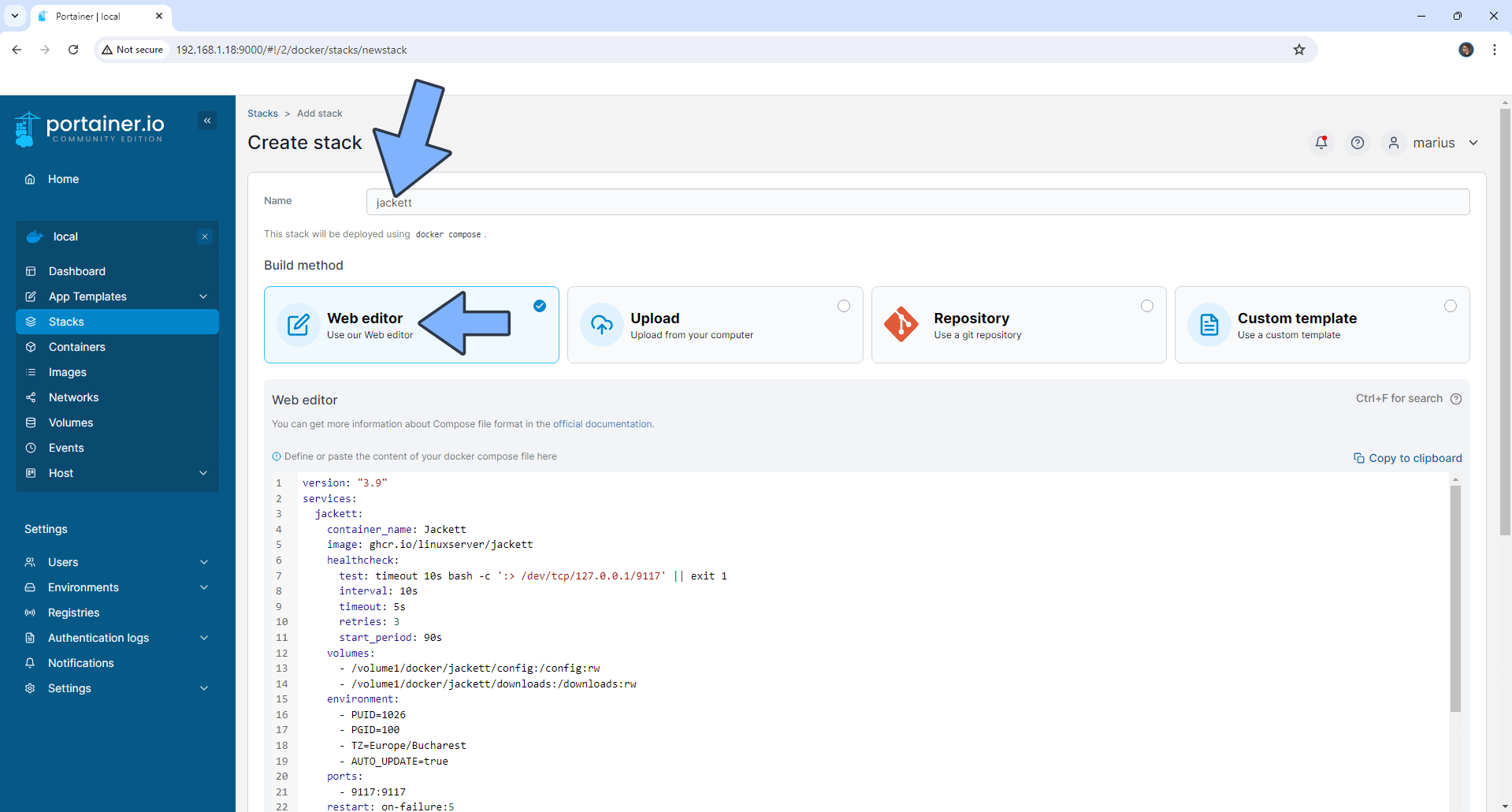
STEP 7
Scroll down on the page until you see a button named Deploy the stack. Click on it. Follow the instructions in the image below. The installation process can take up to a few minutes. It will depend on your Internet speed connection.
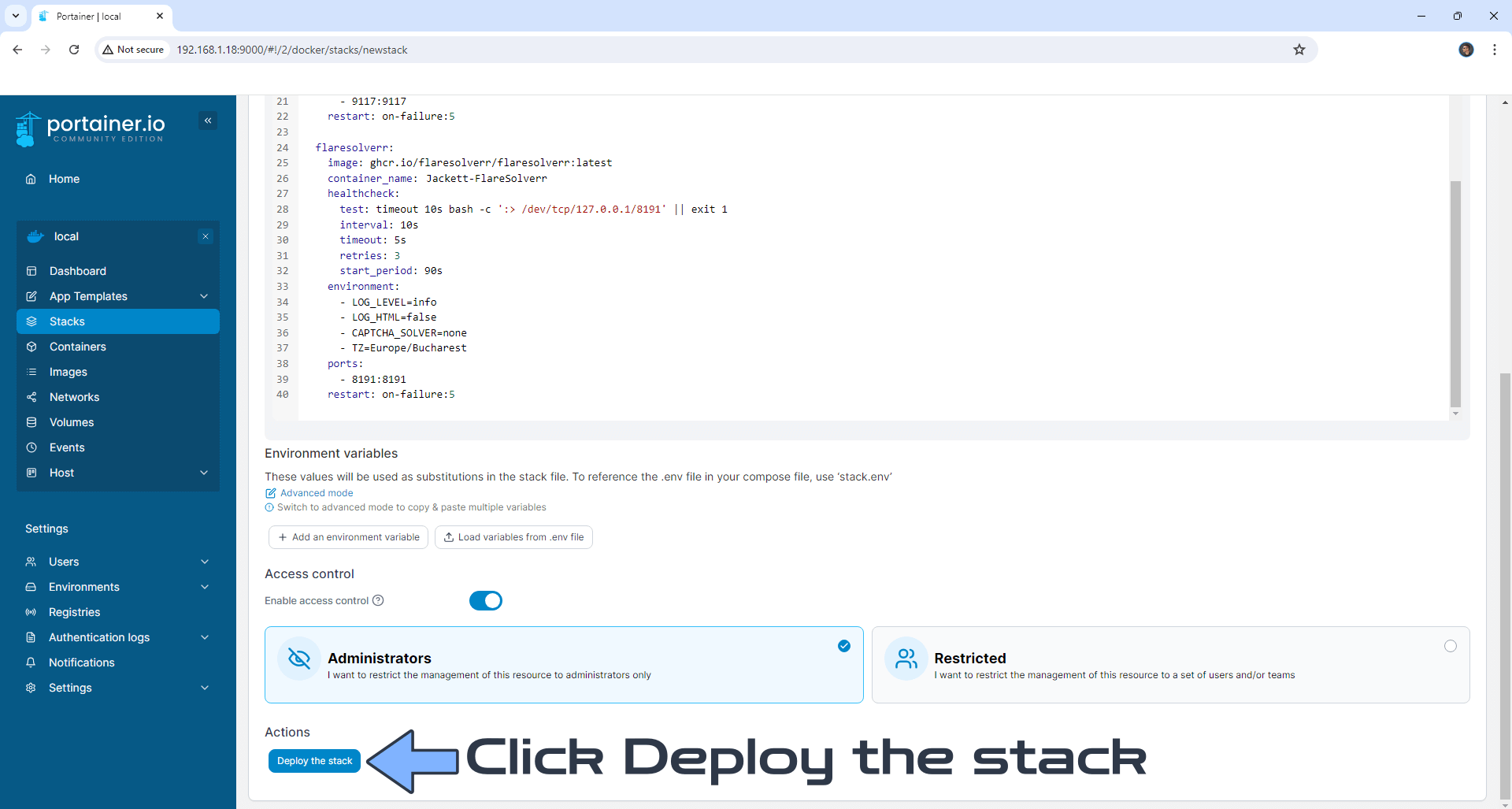
STEP 8
If everything goes right, you will see the following message at the top right of your screen: “Success Stack successfully deployed“.

STEP 9
🟢Please Support My work by Making a Donation. Almost 99,9% of the people that install something using my guides forget to support my work, or just ignore STEP 1. I’ve been very honest about this aspect of my work since the beginning: I don’t run any ADS, I don’t require subscriptions, paid or otherwise, I don’t collect IPs, emails, and I don’t have any referral links from Amazon or other merchants. I also don’t have any POP-UPs or COOKIES. I have repeatedly been told over the years how much I have contributed to the community. It’s something I love doing and have been honest about my passion since the beginning. But I also Need The Community to Support me Back to be able to continue doing this work.
STEP 10
The installation process can take up to a few seconds/minutes. It will depend on your Internet speed connection. Now open your browser and type in http://Synology-ip-address:9117 Scroll down the page. Follow the instructions in the image below.
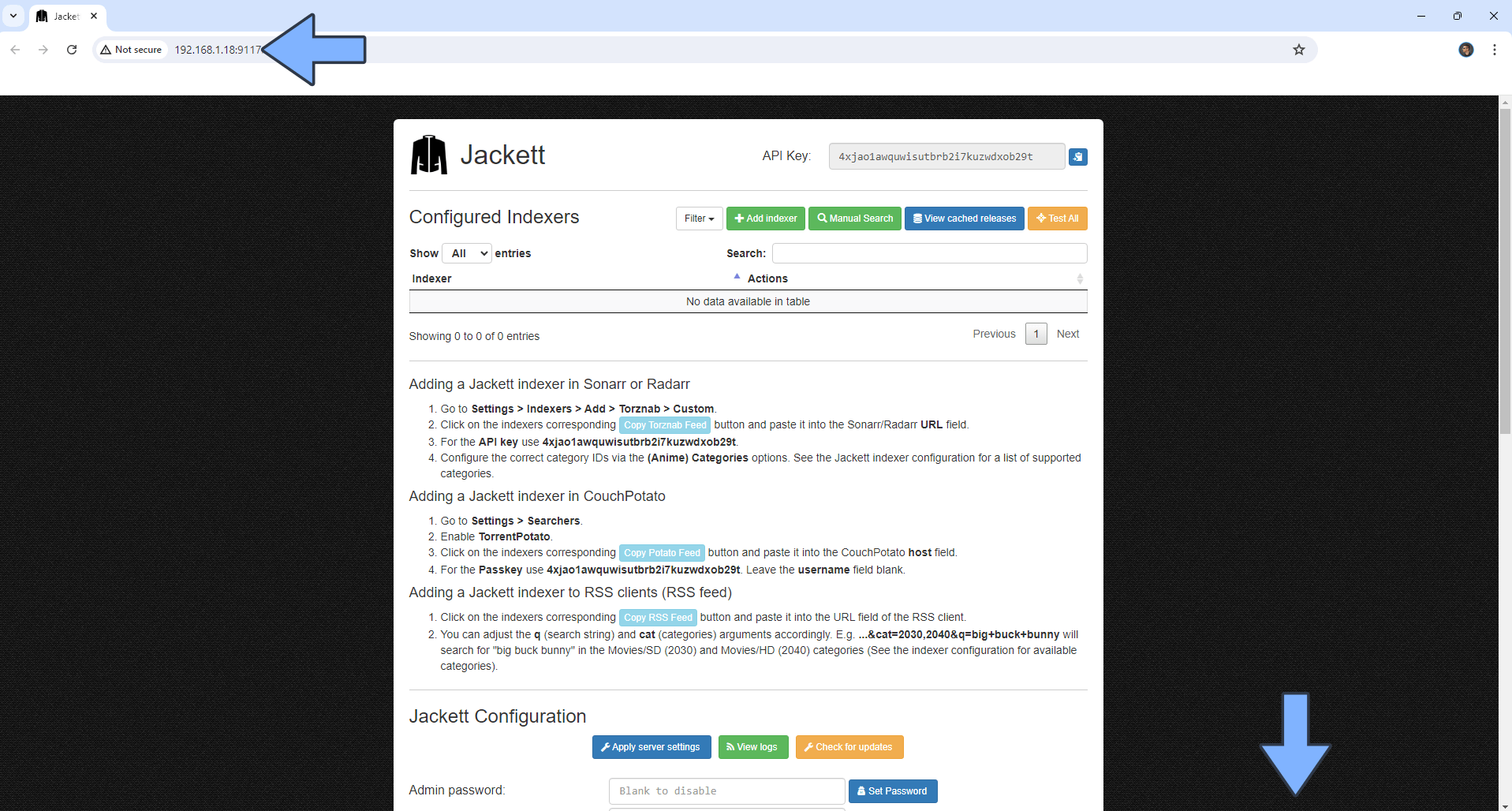
STEP 11
Some indexers may request you to set up FlareSolverr. In this step by step guide I will show you how to add FlareSolverr support to your Jackett. FlareSolverr is a proxy server to bypass Cloudflare and DDoS-GUARD protection. Scroll down the page until you find the FlareSolverr API URL. Type in http://yourNASIP followed by :8191/ then click Apply server settings under the Jackett Configuration. You will receive a message confirming the update. Follow the instructions in the image below.
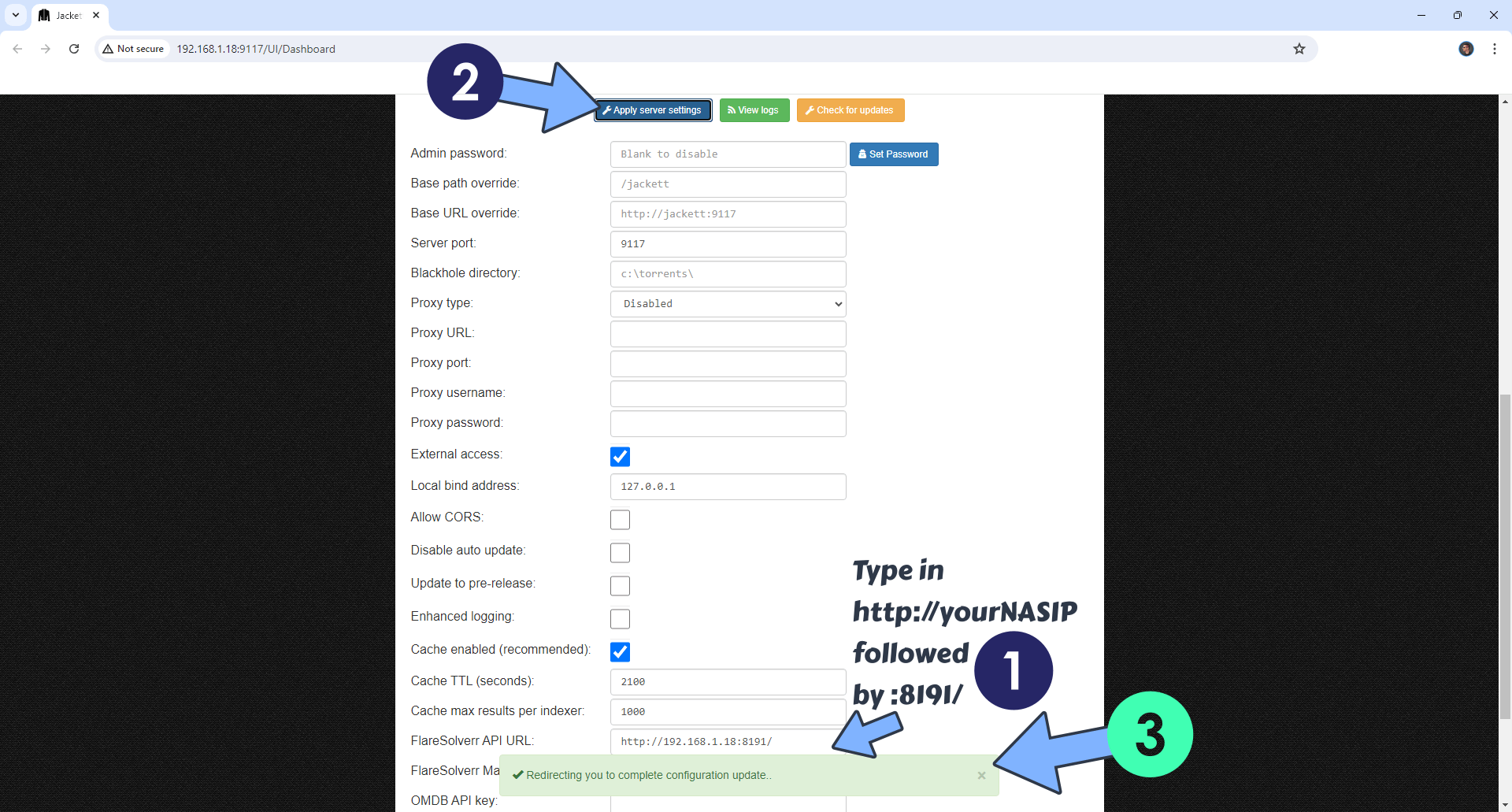
Enjoy Jackett!
If you encounter issues by using this container, make sure to check out the Common Docker issues article.
Note: If you want to run the Jackett container over HTTPS, check How to Run Docker Containers Over HTTPS. In order to make Jackett work via HTTPS, it’s mandatory to activate WebSocket.
Note: Can I run Docker on my Synology NAS? See the supported models.
Note: How to Back Up Docker Containers on your Synology NAS.
Note: Find out how to update the Jackett container with the latest image.
Note: How to Free Disk Space on Your NAS if You Run Docker.
Note: How to Schedule Start & Stop For Docker Containers.
Note: How to Activate Email Notifications.
Note: How to Add Access Control Profile on Your NAS.
Note: How to Change Docker Containers Restart Policy.
Note: How to Use Docker Containers With VPN.
Note: Convert Docker Run Into Docker Compose.
Note: How to Clean Docker.
Note: How to Clean Docker Automatically.
Note: Best Practices When Using Docker and DDNS.
Note: Some Docker Containers Need WebSocket.
Note: Find out the Best NAS Models For Docker.
Note: Activate Gmail SMTP For Docker Containers.
This post was updated on Saturday / February 21st, 2026 at 3:53 PM
